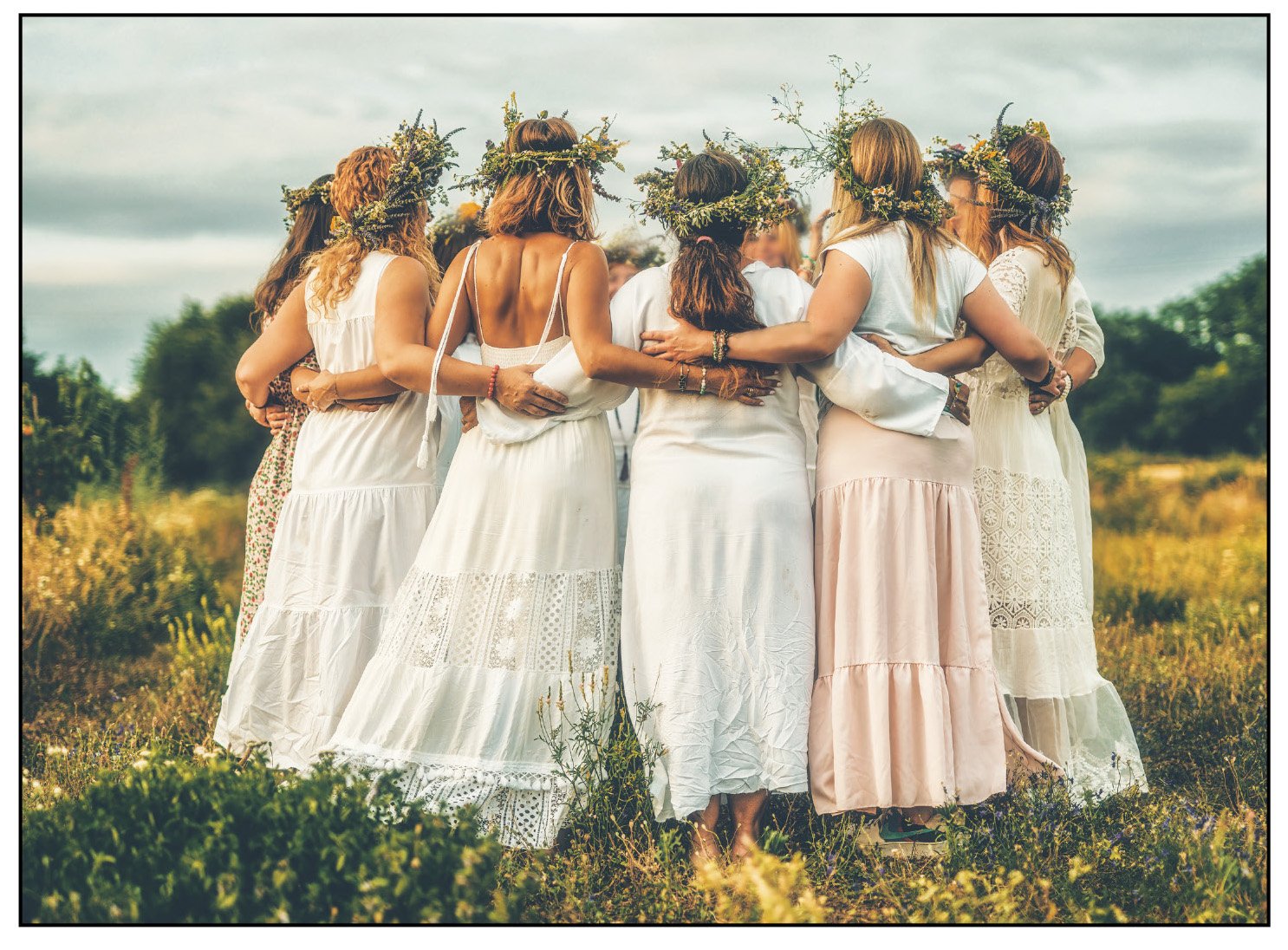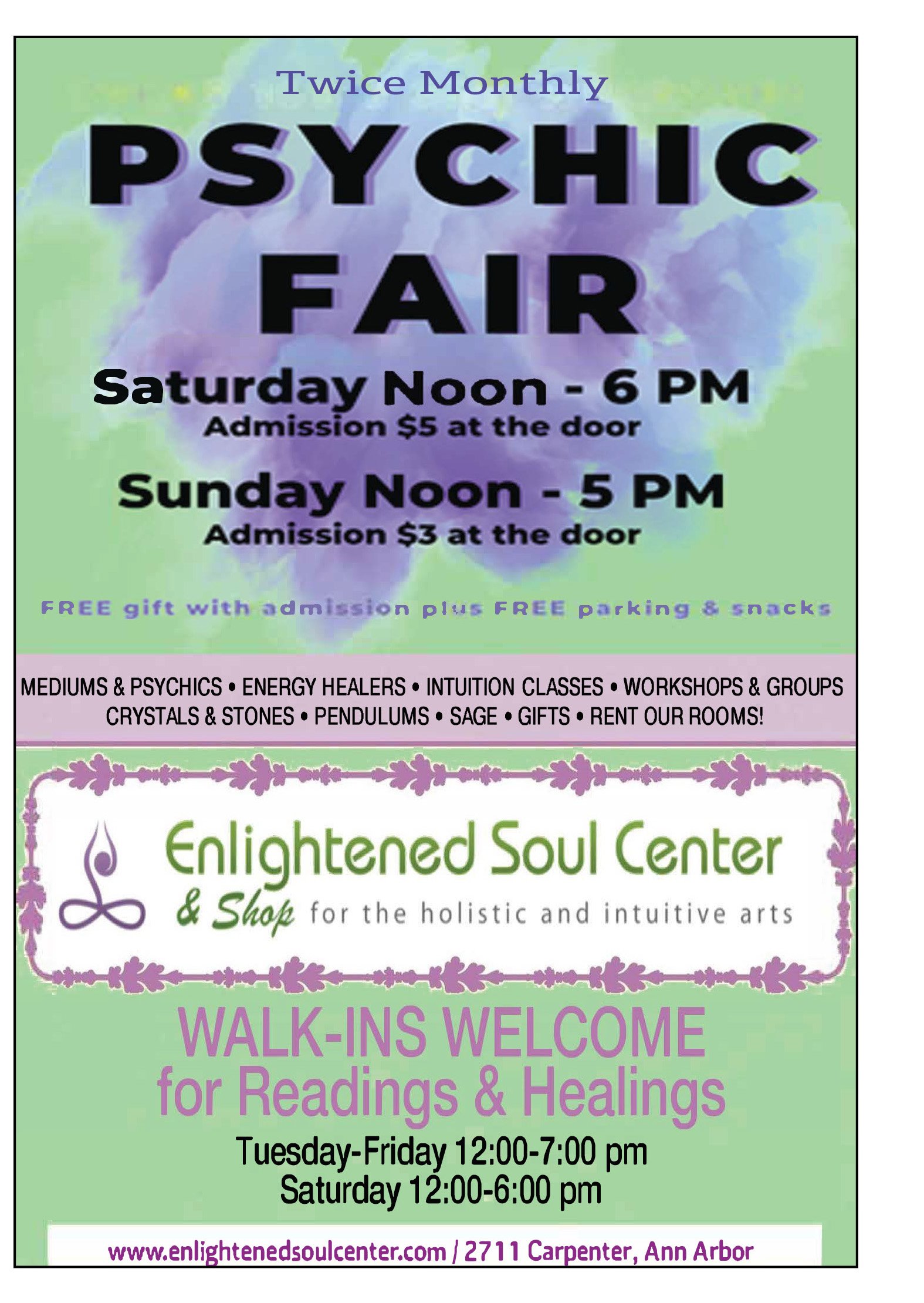By Catherine Carr
I first learned about the Witches of West Michigan in 2022. That was the year a friend invited me to join them on a campground in Ionia for a weekend of camping with fellow witches.
Just a decade ago, being casually invited to such an event would have been unthinkable to me. There were no public-facing witchcraft groups within easy reach of my Michigan hometown at the time. Even though I knew many local people had an interest in the Pagan spiritual arts, practice groups were generally underground and by invitation only.
This culture of secrecy was likely a holdover from the “Satanic Panic” of the 1980s-2000s, which saw groups and individuals suspected of spreading Pagan and Witchcraft teachings being investigated by law enforcement. This moral panic calmed in the mid-2000s after the FBI released official statements that no evidence of violent crime had been discovered in their extensive investigations of Witch and Pagan circles, and that law enforcement agencies were losing track of real violent criminals in their zeal to focus their investigative efforts on “devil worshippers” such as Witches, Pagans, and heavy metal fans.
Witchcraft has been a word used to describe a variety of spiritual practices, including the cultivation of relationships with nature spirits, divination, polytheism, Goddess worship, and the use of magical ritual for self-empowerment since the late 19th century. The precursors to Gerald Gardner’s formulation of Wicca as a religious path credited various goddesses with giving women and peasants the power to resist oppression by patriarchal religions and violent warlords.
In the modern era, Witchcraft has become a catch-all for empowering spiritual practices found in animistic, polytheistic, and Goddess-worship philosophies. The term has even come to include monotheists, including Christians and Jews, who find benefit in contemplating God’s feminine side and atheists who see societal and clinical benefits to Witchcraft practices.
These practices and ideas were banned within mainstream Christianity and Islam for centuries, but more and more scholars are questioning the sometimes hasty scriptural translations that led to the bans. Some have pointed out that blanket Biblical prohibitions on divination and Witchcraft may have been mistranslations from the original Hebrew, and that some Biblical patriarchs appear to use spiritual arts at God’s command throughout the text which many modern churches would probably consider to be Witchcraft.
Witchcraft and Paganism have been among America’s fastest-growing religious and spiritual movements since around 1990. The number of self-identified Witches and Pagans in the United States has doubled every decade since that year, as more and more people found personal empowerment and a theology that promoted sustainable living through personal relationships with nature and self-directed spiritual practices. As knowledge of Pagan and Witchcraft teachings becomes more common, these movements are increasingly becoming seen for the eco-friendly and life-affirming forces that they are.
In the words of Witches of West Michigan administrator Erykah Rose, “‘Witch’ isn’t a bad word anymore.”
In 2020 the numbers of self-identified Witches seemed to reach critical mass in West Michigan, when the Facebook group Witches of West Michigan burst onto the scene and rapidly accrued over 2,500 members. This was their membership count when I was invited to their campout in August of 2022, where group members cooked s’mores over fires, played Pagan music from Bluetooth speakers in the forest, and shared stories of their often magical life journeys.
Sitting around the campfire, it was easy to see the appeal of magical spiritual communities. Here were people who walked off the beaten path, often after watching societal systems spectacularly fail them and their loved ones. Here was a group of people who accepted their stories of serendipity, magic, divine intervention, and finding personal power with gratitude for their shared experiences. Notably absent was the judgmental attitude I’d found in the religious organizations of my youth, where firsthand spiritual and religious experiences were actually discouraged and criticized if they did not match the sensibilities of local authority figures. Here, people could be supported in being their truest selves.
For this article I interviewed Erykah Rose, a member of the moderator and administrator team that’s planning the Witches of West Michigan’s next move.
Rose told me that, to her, being a Witch meant taking an uncommon path. “It means being a part of the world, but also being separate from it since many parts of society will reject you for going against the grain. It means following your spirit’s truest purpose. Being a Witch has always felt like an innate part of me. I’ve always felt a pull toward Witchcraft.”
According to Rose, she never saw Witches as being malevolent growing up. “To me, a Witch was someone who knew their own mind and their own power. Being a Witch meant never letting anyone take your power from you. It meant knowing yourself wholly, your knowledge and feelings. It meant not bowing to society’s expectations, knowing yourself so much that you weren’t afraid to be yourself.”
Witchcraft has, from the beginning, been about self-determination. And that is arguably part of what fueled the “Satanic Panic” of the 21st century. Many segments of society once assumed that Witches, with their refusal to conform and follow the rules, must obviously have used their freedom and autonomy to do harm. But as wave after wave of abuse and fraud scandals break in major religious and political institutions, more and more people are coming around to the idea that cultivating one’s own power and resisting outside pressures is in fact a powerful way to do good.
“To me,” Rose said, “Witchcraft is about cultivating the self. It’s about finding growth in turbulent times. And by growth, I mean taking control of the things you can control and becoming stronger in the face of adversity. Witchcraft kind of saved my life, in that sense.”
I don’t pry into that personal statement, but it’s a statement I hear often. Like with many religious converts, Pagans and Witches often report being failed by societal systems and other philosophies before finding the strength they needed to survive in Paganism and Witchcraft.
When asked if there was any marketing magic behind the group’s explosive growth, Rose said the answer was “no.” “It’s really all been organic,” she told me. “People were really hungry for a group like this. We saw about 800 people join after our local news covered one of our events in early 2023, but we were already thousands strong before that.”
As of today, the Witches of West Michigan membership stands at nearly 4,000. The group is currently drawing up plans to expand their calendar of both in-person and online activities into 2024. They already host monthly practices of their choir, the Michigan Muses; co-sponsor and co-host Grand Rapids Pagan Pride; and are planning on organizing regular workshops and classes in partnership with Grand Rapids’ Black Cat Bodega.
“On Wednesdays, in our Facebook group we have ‘Ask a Witch Wednesdays,’” Rose explained to me. “We want this to be a time when people can come and ask questions without feeling intimidated or judged. We were all new to Witchcraft or didn’t know much about it at one point. We want to be here to answer people’s questions and show them that there are multiple ways of working on the same problem.”
“We also have Small Business Saturdays, where people with witchy businesses can advertise on the group’s Facebook page.” The group maintains an online directory of member-owned businesses which include legal services, doulas, locally Witch-made body care products, and education and coaching in wildcraft, herbology, art, and music.
Rose shares that the group is not tradition-specific and is friendly to people of all religious and traditional backgrounds. “We’re not all Wiccans, though we do count them in our number, and we’re not here to tell people what to do or to gatekeep,” Rose said. “We’re here to offer resources and community to help support them in growing on their own path. We have self-identified Jewish and Christian witches. We have people of lots of different Pagan traditions. A lot of us are eclectic Witches,” she said, referring to Witches who do not follow an established tradition but rather incorporate the spiritual practices that feel right to them.
One of the group’s future goals is to help Michigan-based Witches to find Witchcraft and Pagan events happening near them throughout the state.
“The response to the group has been really incredible,” Rose told me. “So many people have come forward saying, ‘I thought I was alone. But now, I see that I’m not.’”
With the work of organizers like the Witches of West Michigan founders and administrators, Witches and Pagans don’t need to feel alone in Michigan any longer.
People who host, or are planning to host open-to-the-public Witch or Pagan events are encouraged to contact the Witches of West Michigan leadership team at witchesofwmi@gmail.com if they wish to publicize their events to the group’s membership. You can find the West Side Witches on Facebook @witchesofwestmichigan.
Catherine Carr earned her degree in Neuroscience from the University of Michigan in 2011, and she applies a scientific mindset to her investigation of religious and spiritual topics. Her book, World Soul: Healing Ourselves and the Earth through Pagan Theology, is available on Amazon, or free in digital format through her website CatherineCarr.org.





















































































































































































Just a decade ago, being casually invited to such an event would have been unthinkable to me. There were no public-facing witchcraft groups within easy reach of my Michigan hometown at the time. Even though I knew many local people had an interest in the Pagan spiritual arts, practice groups were generally underground and by invitation only.